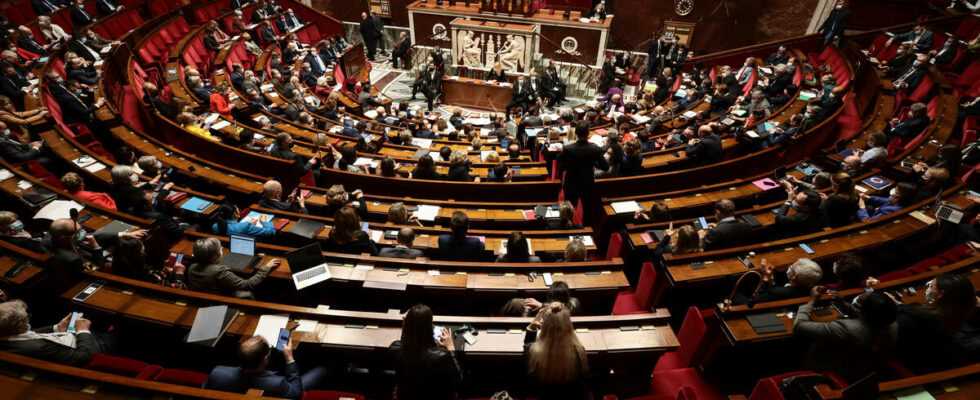After the presidential election and the re-election of Emmanuel Macron at the Elysee Palace on Sunday, the legislative elections are fast approaching, on June 12 and 19. Details on this ballot under tension.
Some speak of it as the “third round” of the presidential election. A few weeks after the ballot which saw Emmanuel Macron re-elected for five years, the legislative elections take place in June. Sundays 12 and 19, precisely. The 577 deputies of the National Assembly are elected there. This year, they are particularly awaited by the oppositions, who hope to form groups large enough to be able to twist the arm of Macronist power during the second term.
What are legislative elections (and when)?
Since 2002 and the advent of the five-year term, the electoral calendar has been reversed to make the legislative elections follow the presidential election by a few weeks, instead of preceding it as was the case before. This year, they take place on Sundays June 12 and 19 in mainland France (the day before with the time difference in certain DOM-TOMs).
Since 1958, the legislative elections have been a direct universal majority vote (the person elected is the one who wins the most votes), uninominal (one person is elected and not a list) and in two rounds. 48.7 million voters, according to the latest INSEE count, elect the deputies in the 577 constituencies of France, i.e. a multitude of local elections. This explains why we speak of “the” legislative, unlike the “presidential” which does not designate a single President of the Republic.
For the parties, the most ambitious objective is to obtain an absolute majority in the National Assembly, ie 289 deputies. And thus impose cohabitation on the Head of State. At a minimum, they can form parliamentary groups, with at least 15 deputies. Hence the negotiations between political formations, on the left as in macronie and on the far right.
What about the “triangular”?
On the one hand, a candidate can win in the first round if he obtains the majority of the votes cast, representing at least 25% of those registered. The participation rate is therefore decisive. In 2017, 57.36% of registered voters abstained, a record under the Fifth Republic, raising the necessary score by the same amount.
On the other hand, to qualify for the second round, the candidate must, not obtain one of the two best scores as for the presidential election, but collect at least 12.5% of the votes. Three candidates can therefore be in the second round. This is then referred to as “triangular”. And “quadrangular” when, more rarely, there are four candidates in the second round. To be elected deputy, it is then enough to arrive at the head, whatever the final number of voices.
What rules for MPs?
This year, aspirants to deputy must apply between May 16 and May 20. They will then be able to enter the campaign from May 30.
“To allow any citizen, whatever his social condition, to be able to exercise a mandate” and their “enable them to exercise their mandate in complete independence”, MPs receive a parliamentary allowance. It amounts to 5,679.71 euros net monthly. Added to this are the residence allowance (168.70 euros) and the function allowance (1,447.98 euros), for a gross total of 7,239.91 euros, “subject to social contributions and taxable according to the rules applicable to salaries and wages”specifies the site of the Assembly.
A deputy is surrounded by collaborators. For each of them, the deputy has an envelope of 10,581 euros per month. It should be noted that since the law of September 15, 2017, it is prohibited to hire relatives as parliamentary collaborators.
Without forgetting that the deputies cannot cumulate certain mandates. Since the law of February 14, 2014, a deputy cannot also be mayor, borough mayor, deputy mayor, deputy mayor, president or vice-president of regional and departmental councils and intermunicipal cooperation establishments with their own tax system. Ditto for a position of minister in the government.
In addition, a deputy must belong to one of the eight permanent committees of the Assembly, those which prepare the ground before the burning parliamentary debates.
What is a “partial” legislative election?
It is possible that a deputy must be replaced during his mandate, if he is ill, dies or resigns to run for another office, or if his election is annulled by a judge. It is at this time that a partial legislative election is organized.
The last partial legislative elections date back to May 30 and June 6, 2021, in the 15th district of Paris to replace George Pau-Langevin, who resigned because he was appointed Deputy Defender of Rights, as well as in the sixth district of Pas-de-Calais. , the third in Indre-et-Loire and the first in Oise.
It should be noted that no by-election can however take place in the twelve months which precede the expiration of the powers of the National Assembly.
